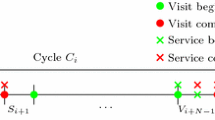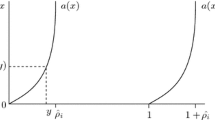Abstract
We present an analytical approach to approximate the expected waiting times of move requests (customers) served by a single handling device (server) that operates according to the First-Encountered-First-Served (FEFS) rule, which is a common rule employed for polling-based material handling systems. Under the FEFS rule, the device inspects each station according to a prespecified polling sequence and serves the first move request it encounters. Polling resumes as soon as the device completes serving a move request. The expected waiting times are important for estimating the expected Work-In-Process (WIP) levels at individual stations and to gauge the overall performance of the system. Moreover, the polling sequence itself can affect the expected waiting times. If the device meets the throughput requirement under more than one polling sequence, the results we present can also be used to evaluate alternative polling sequences. In fact, using the analytical results and a numerical example, we show that alternative polling sequences, even if they impose the same ``workload factor'' on the device, can lead to significantly different expected WIP levels.
Similar content being viewed by others
References
Bartholdi, J.J., III and Platzman, L.K. (1989) Decentralized control of automated guided vehicles on a simple loop. IIE Transactions, 21(1), 76-81.
Bozer, Y.A., Cho, M.S. and Srinivasan, M.M. (1994) Expected waiting times in single-device trip-based material handling systems. European Journal of Operational Research, 75, 200-216.
Bozer, Y.A. and Kim, J. (1996) Determining transfer batch sizes in trip-based material handling systems. International Journal of Flexible Manufacturing Systems, 8, 313-356.
Bozer, Y.A. and Srinivasan, M.M. (1991) Tandem configurations for automated guided vehicle systems and the analysis of single-vehicle loops. IIE Transactions, 23(1), 72-82.
Chow, W.M. (1986) Design for line flexibility. IIE Transactions, 18(1), 95-108.
Kleinrock, L. (1975) Queueing Systems, Volume 1: Theory, Wiley, New York, p. 169.
Srinivasan, M.M. (1991) Nondeterministic polling systems. Management Science, 37(6), 667-681.
Srinivasan, M.M., Bozer, Y.A. and Cho, M.S. (1994) Trip-based material handling systems: throughput capacity analysis. IIE Transactions, 26(1), 70-89.
Stone, H.S. and Fuller, S.H. (1973) On the near-optimality of the shortest-latency-time-first drum scheduling discipline. Communications of the ACM, 16(6), 352-353.
Tompkins, J.A., White, J.A., Bozer, Y.A., Frazelle, E.H., Tanchoco, J.M.A. and Trevino, J. (1996) Facilities Planning, 2nd edn, Wiley, New York.
Wolff, R.W. (1982) Poisson arrivals see time averages. Operations Research, 30, 223-231.
Author information
Authors and Affiliations
Rights and permissions
About this article
Cite this article
Bozer, Y.A., Park, J.H. Expected move request waiting times in single-device, polling-based material handling systems. IIE Transactions 33, 55–63 (2001). https://doi.org/10.1023/A:1007689707766
Issue Date:
DOI: https://doi.org/10.1023/A:1007689707766




